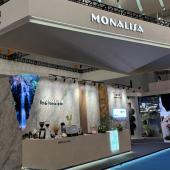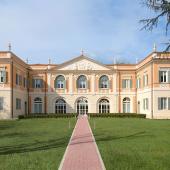A difficult 2001 for Turkish tiles
According to Adnan Polat (pictured in photo), current chairman of Serkap (Turkish ceramic tile manufacturers' association), the sector has been severely affected by the domestic financial crisis, although there are margins for recovery (see complete interview in the "In depth" section). As for the performance of the sector in the first half of 2002, although the domestic market situation has not changed significantly compared to the 2001 figures, exports are quite a different matter with a 25% increase between January and June this year over the same period in 2001. Sales to the United States, Great Britain, Israel, France and Canada were particularly positive.
The year 2001 survey released by Serkap reveals a sector consisting of 24 companies (one more than in 2000) which employ a total of 9,800 people and have a production capacity of 250 million square metres of tiles (compared to 226 million in 2000). In 2001, total sales amounted to 150 million square metres, including 93 million sq.m to the domestic market and 57 million sq.m exports. Germany remains the main foreign market (10.6 million sq.m) followed by the USA (5.6 million sq.m, +30.2%) and the UK (5 million sq.m, +19%). Last year imports fell sharply (-14.4%) to a total of 1.2 million sq.m.
Interview with Adnan Polat, current chairman of Serkap, Turkish ceramic tile manufacturers' association
CWW: The Turkish ceramic industry achieved outstanding results in 2000. So what happened in 2001?
Adnan Polat: During the first few months of 2001 the sector began to feel the effects of the domestic financial crisis: 80% inflation, a World Bank debt of 30 billion dollars and a drastic cut in public spending by the Government, which effectively blocked investments. The difficulties are continuing this year, if to a lesser extent. The tile industry reacted to the situation by cutting back production. In 2001 it produced a total of 155 million square metres, using just 65% of its capacity of around 250 million square metres. Many companies reduced their productive activity by as much as 50%, bringing investments to a standstill.
CWW: How has the domestic market been affected by the financial crisis?
A. Polat: Domestic demand and consumption has fallen significantly. Today our domestic market can absorb about 100 million square metres (40% of production capacity), although there are signs of recovery for the second half of 2002. Clearly the main objective is to increase exports.
CWW: Which in any case continued to grow last year.
A. Polat: Yes, but not sufficiently. The current level of exports - 57 million square metres - accounts for 20% of our production capacity but we need to double this figure to reach at least 40%.
CWW: What strategies are you using to achieve this?
A. Polat: As usual, the key factors are products, service and better prices. The problem is that only the larger companies are capable of competing in terms of all three of these, whereas the smaller companies (the most numerous) are at a disadvantage with regard to prices. Out of a total of 24 companies or groups, only 6 produce more than 10 million square metres a year.
CWW: Is this just a problem of company size?
A. Polat: No, there is also the factor of age of individual companies. Half the companies started up during the last decade and still lack experience and knowledge of international markets. Not that the rest of the sector has a much longer history: apart from the Kale Group which was founded in the 1960s and Ege in 1972, the Turkish ceramic industry is no more than 20 years old, so it is a relatively young industry.
CWW: Nonetheless your association appears to be very active and dynamic.
A. Polat: Above all we seek to perform a unifying function for the sector, which is still very divided and heterogeneous, especially compared with the Italian or Spanish tile industries. A stronger corporate cultural is also needed.
CWW: Do you see any other structural obstacles?
A. Polat: There's the problem of the lack of a service sector for the ceramic industry, which means that businesses have to deal internally with aspects that could easily be delegated to outside companies. This certainly does nothing to help reduce costs.
CWW: But in spite of this you are optimistic.
A. Polat: In 2002 inflation fell for the first time in 20 years. This is a positive sign. It is now 35% and forecasts for 2003 indicate that it will continue to fall to 15%. Apart from this, I believe that as early as 2003 we should be able to increase tile production to 85% of capacity. Our long-term goals are much more ambitious. In 10 years time we expect to see Turkey reach a production capacity of 400 million square metres and exports of 250 million square metres.
CWW: Where are the main markets for Turkish tiles?
A. Polat: Western Europe, the Middle East and North America. We are also beginning to enter the markets of the Far East, particularly Japan and Australia.
CWW: You are the chairman of Ege. Can you tell us how your company reacted to the difficulties of 2001?
A. Polat: In our case we have not had to cut back production (22 million square metres/year) because we have very high export levels, equivalent to half of our output. We have a warehouse at Coblenza, in Germany, and another at Sassuolo, in Italy. Likewise in the sanitaryware sector, where we have an annual production of 600,000 pieces, exports account for 70%. Next year we plan to expand the sanitaryware plant in order to double output.
The ceramic tile sector in Turkey has developed principally due to the investments made from 1990 onwards, which have transformed the country into one of the world's leading ceramic producing countries. Turkey is the world's fifth largest tile producer (3.2% of world production) and eighth largest market with domestic demand of about 100 million square metres a year. After Italy and Spain, it ranks third in Europe in terms of both production (8.2%) and exports. The leading companies in the sector are Kale, followed by Toprak, Ege and Eczacibasi. In general, the companies have hi-tech plant capable of guaranteeing high-quality products. One of the Turkey's major advantages for ceramic production is its ease of access to high-quality raw materials, which are available in sufficient quantities to fully meet the demand from local industry and at the same time to allow good levels of export of excess quantities. Turkey is particularly rich in feldspar and clay. Feldspar is quarried in the western regions of the country and is exported predominantly to the leading ceramic producer countries such as Italy and Spain. White clay, the best for ceramic production, is available in rich beds in the northwest of the country. Turkey also possesses 65% of the world's total boron reserves.
Eczacibasi, Turkey's first ceramic sanitaryware producer, was founded in 1958. Ever since, the company has led the sector in terms of both variety and capacity by producing over 500 different models. Eczacibasi Construction Group has a wide range of highly diversified products. Under the Vitra and Artema trademarks it produces ceramic sanitaryware, ceramic floor, wall and swimming pool tiles, bathroom accessories and furniture, acrylic bathroom tubs and shower trays, kitchen furniture and ceramic adhesives. The Group also includes the companies Esan and Doga, which produce industrial raw materials, semi-finished products, ceramic kilns and equipment and insulating materials. Eczacibasi Karo Seramik, the tile production company, has two factories in Turkey and one in Ireland with a total production capacity of 16 million square metres per year, 60% of which is exported. The range consists of 4,000 kinds of products, which are marketed under the Vitra Residence and Vitra Architect trademarks. The Eczacibasi Construction Group's foreign market sales currently amount to 45% of output and the Group aims to increase this figure by 15% in value over 2001. The most important markets are Europe and the USA, but the Group also exports sizeable quantities to Australia and New
Zealand. Internet: http://www.eczacibasi.com
Ege Seramik was founded in 1972 and now has a production capacity of 22 million square metres of tiles per year (making it Turkey's third largest producer) and 500,000 pieces of sanitaryware per year. The company belongs to Polat Holding, which also owns the sanitaryware manufacturer Vitrifiye and the ceramic raw materials company Polat Madencilik. The Group is enjoying a good period for exports. Ege exports 50% of its tile production, while its exports of sanitaryware increased during 2001 to 35% of output. The company aims to increase this percentage to 65% of output within a short timeframe. Ege has 260 distributors for domestic sales. Exports are made through Ceram Trading (CT) for sales to Germany, USA, Hungary, France and Switzerland, while Ege Seramik Dis Ticaret is responsible for sales to Eastern countries.
Internet: http://www.egeseramik.com
The Kale Group is celebrating the 45th anniversary of its foundation this year. Turkey's first ceramic producer company was �anakkale Seramik, which was founded in 1957, followed by Kalebodur Seramik in 1972. The two companies merged in 2000 under the name of Kaleseramik �anakkale Kalebodur Seramik. Kaleseramik, which manufactures its products under the trademarks of Seramik and Kalebodur, has a production capacity of 62 million square metres/year of tiles. It exports 50% of its output to more than 50 countries. With the entire productive activity concentrated on a single site, Kaleseramik is the largest ceramic factory in the world. Alone it accounts for 33% of Turkish ceramic production and has a 40% share of total exports. The company produces 2,000 kinds of floor tiles in 40 different sizes as well as 1,350 kinds of wall tiles in 30 different sizes. One of the most interesting recent product introductions is Kaleflex, a tile with dimensions of 3m x 1m x 3mm. The product has an unglazed porcelain tile structure and comes in various colours and with a decorative effect.
Internet: http://www.kale.com.tr
Toprak Seramik has been operating since 1981 and is Turkey's second largest tile manufacturer with an annual capacity of 25 million square metres. The most important new development at Toprak is its entry into the porcelain tile segment, where it has started up production with an initial capacity of 2 million square metres/year. Toprak also produces sanitaryware using the latest technology such as high-pressure casting systems. Toprak Seramik exports 50% of its tiles and 75% of its sanitaryware production to the UK, Germany, Holland and many other countries. The company has also received ISO 9001 quality certification.
Internet: http://www.toprak.com.tr
Did you find this article useful?
Join the CWW community to receive the most important news from the global ceramic industry every two weeks
Recent articles
Guocera invests in large slab production
Jul 14, 2025
Ceramic World Review 162/2025
Jul 11, 2025
China’s tile industry and market continue to decline
Jul 11, 2025
Chinese tile exports fall to 600 million sqm
Jul 11, 2025
Florim releases its 17th Sustainability Statement
Jul 10, 2025





















